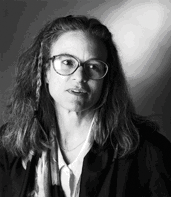One Art
BY PROF. VAROL AKMAN
Sharon Olds
"If the amount I've written is like a yard long, the amount of it that's been sent out, or published, is like an inch. Because so much of it is awful."
Sharon Olds was born in 1942 in San Francisco. She attended Stanford and earned her Ph.D. in American literature from Columbia University in 1972. She published her first book of poems, Satan Says, in 1980 and received the inaugural San Francisco Poetry Center Award. Her next book, The Dead and the Living (1983), won the Lamont Poetry Selection and the National Book Critics Circle Award. A compilation of selected poems covering the period 1980-2002, Strike Sparks, was released in 2004. Other volumes include The Gold Cell (1987); The Matter of This World (1987); The Sign of Saturn (1991); The Father (1992); The Wellspring (1996); Blood, Tin, Straw (1999); The Unswept Room (2002); and One Secret Thing (2008).
Olds has won numerous awards, including fellowships from the Guggenheim Foundation and the National Endowment for the Arts. She is a chancellor of the Academy of American Poets and a member of the American Academy of Arts and Sciences. An outspoken opponent of the war in Iraq, she declined in 2005 an invitation from Laura Bush to attend the National Book Festival. In an emotional open letter published in The Nation, Olds stated that many U.S. citizens who had felt pride in their country are now tormented and distressed by the atrocities.
Olds writes accessible and free style verse. Often formulated in the first-person, her poetry is known for both its exactitude and  ingenuity. Olds's honesty in her poems has led to both praise and disapproval. She regularly includes personal details about her children, her parents and, notoriously, her intimate life. This prompted critic Helen Vendler to label Olds's work as hedonistic, melodramatic, and even explicit. In The Independent, Christina Patterson disagreed: "It's hard to think of a poet alive who writes with greater intensity about the human body than Sharon Olds." Booker Prize-winning novelist Michael Ondaatje likes the tough, witty, and warm spirit of Olds's poetry "as she carries the reader through rooms of passion and loss." Olds was compared with the great "confessional" poets Sylvia Plath and Anne Sexton. But she noted, in an interview with Patterson, that Muriel Rukeyser, Gwendolyn Brooks, and Galway Kinnell had a bigger influence on her: "I felt, once I read her, that Plath was a great genius, with an IQ of at least double mine, and though I had great fellow feeling for Anne Sexton being the woman in that world, their steps were not steps I wanted to put my feet in."
ingenuity. Olds's honesty in her poems has led to both praise and disapproval. She regularly includes personal details about her children, her parents and, notoriously, her intimate life. This prompted critic Helen Vendler to label Olds's work as hedonistic, melodramatic, and even explicit. In The Independent, Christina Patterson disagreed: "It's hard to think of a poet alive who writes with greater intensity about the human body than Sharon Olds." Booker Prize-winning novelist Michael Ondaatje likes the tough, witty, and warm spirit of Olds's poetry "as she carries the reader through rooms of passion and loss." Olds was compared with the great "confessional" poets Sylvia Plath and Anne Sexton. But she noted, in an interview with Patterson, that Muriel Rukeyser, Gwendolyn Brooks, and Galway Kinnell had a bigger influence on her: "I felt, once I read her, that Plath was a great genius, with an IQ of at least double mine, and though I had great fellow feeling for Anne Sexton being the woman in that world, their steps were not steps I wanted to put my feet in."
The following poem appeared in The Dead and the Living. Olds made the following comment about its provenance: "Being a mother poet, children often just hand you a poem, especially if they're very good at something that you're very bad at."
The One Girl at the Boys' Party
When I take my girl to the swimming party
I set her down among the boys. They tower and
bristle, she stands there smooth and sleek,
her math scores unfolding in the air around her.
They will strip to their suits, her body hard and
indivisible as a prime number,
they'll plunge in the deep end, she'll subtract
her height from ten feet, divide it into
hundreds of gallons of water, the numbers
bouncing in her mind like molecules of chlorine
in the bright blue pool. When they climb out,
her ponytail will hang its pencil lead
down her back, her narrow silk suit
with hamburgers and french fries printed on it
will glisten in the brilliant air, …